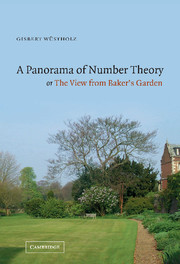Book contents
- Frontmatter
- Contents
- Contributors
- Introduction
- 1 One Century of Logarithmic Forms
- 2 Report on p-adic Logarithmic Forms
- 3 Recent Progress on Linear Forms in Elliptic Logarithms
- 4 Solving Diophantine Equations by Baker's Theory
- 5 Baker's Method and Modular Curves
- 6 Application of the André–Oort Conjecture to some Questions in Transcendence
- 7 Regular Dessins, Endomorphisms of Jacobians, and Transcendence
- 8 Maass Cusp Forms with Integer Coefficients
- 9 Modular Forms, Elliptic Curves and the ABC-Conjecture
- 10 On the Algebraic Independence of Numbers
- 11 Ideal Lattices
- 12 Integral Points and Mordell–Weil Lattices
- 13 Forty Years of Effective Results in Diophantine Theory
- 14 Points on Subvarieties of Tori
- 15 A New Application of Diophantine Approximations
- 16 Search Bounds for Diophantine Equations
- 17 Regular Systems, Ubiquity and Diophantine Approximation
- 18 Diophantine Approximation, Lattices and Flows on Homogeneous Spaces
- 19 On Linear Ternary Equations with Prime Variables – Baker's Constant and Vinogradov's Bound
- 20 Powers in Arithmetic Progression
- 21 On the Greatest Common Divisor of Two Univariate Polynomials, I
- 22 Heilbronn's Exponential Sum and Transcendence Theory
17 - Regular Systems, Ubiquity and Diophantine Approximation
Published online by Cambridge University Press: 20 August 2009
- Frontmatter
- Contents
- Contributors
- Introduction
- 1 One Century of Logarithmic Forms
- 2 Report on p-adic Logarithmic Forms
- 3 Recent Progress on Linear Forms in Elliptic Logarithms
- 4 Solving Diophantine Equations by Baker's Theory
- 5 Baker's Method and Modular Curves
- 6 Application of the André–Oort Conjecture to some Questions in Transcendence
- 7 Regular Dessins, Endomorphisms of Jacobians, and Transcendence
- 8 Maass Cusp Forms with Integer Coefficients
- 9 Modular Forms, Elliptic Curves and the ABC-Conjecture
- 10 On the Algebraic Independence of Numbers
- 11 Ideal Lattices
- 12 Integral Points and Mordell–Weil Lattices
- 13 Forty Years of Effective Results in Diophantine Theory
- 14 Points on Subvarieties of Tori
- 15 A New Application of Diophantine Approximations
- 16 Search Bounds for Diophantine Equations
- 17 Regular Systems, Ubiquity and Diophantine Approximation
- 18 Diophantine Approximation, Lattices and Flows on Homogeneous Spaces
- 19 On Linear Ternary Equations with Prime Variables – Baker's Constant and Vinogradov's Bound
- 20 Powers in Arithmetic Progression
- 21 On the Greatest Common Divisor of Two Univariate Polynomials, I
- 22 Heilbronn's Exponential Sum and Transcendence Theory
Summary
Introduction
Approximation of real and complex numbers by rationals and algebraic numbers appeared first in papers by Dirichlet, Liouville and Hermite on Diophantine approximation and the theory of transcendental numbers. During the first three decades of the 20th century, E. Borel and A. Khintchine introduced the so-called metric (or measure theoretic) approach in which one considers approximation to any number which does not belong to an exceptional null set (i.e., a set of measure zero). Neglecting such exceptional sets can lead to strikingly simple and general theorems, such as Khintchine's theorem (see below). The exceptional sets can be analysed more deeply by using Hausdorff dimension, which can distinguish between different null sets.
This article gives an account of results, methods and ideas connected with Lebesgue measure and Hausdorff dimension of such exceptional sets. We will be concerned mainly with the lower bound of the Hausdorff dimension. Although determining the correct lower bound for the Hausdorff dimension of a set is often (though by no means always) harder than determining the correct upper bound, recent developments indicate that for many problems, the correct lower bound can be established using information associated with the upper bound. There are some exceptions to this principle. For example, convergence in the Khintchine–Groshev type theorem (for terminology see Bernik & Dodson 1999) for the parabola is related to the upper bound which was proved in Bernik (1979). Nevertheless the divergence case is still unsettled.
- Type
- Chapter
- Information
- A Panorama of Number Theory or The View from Baker's Garden , pp. 260 - 279Publisher: Cambridge University PressPrint publication year: 2002
- 6
- Cited by



